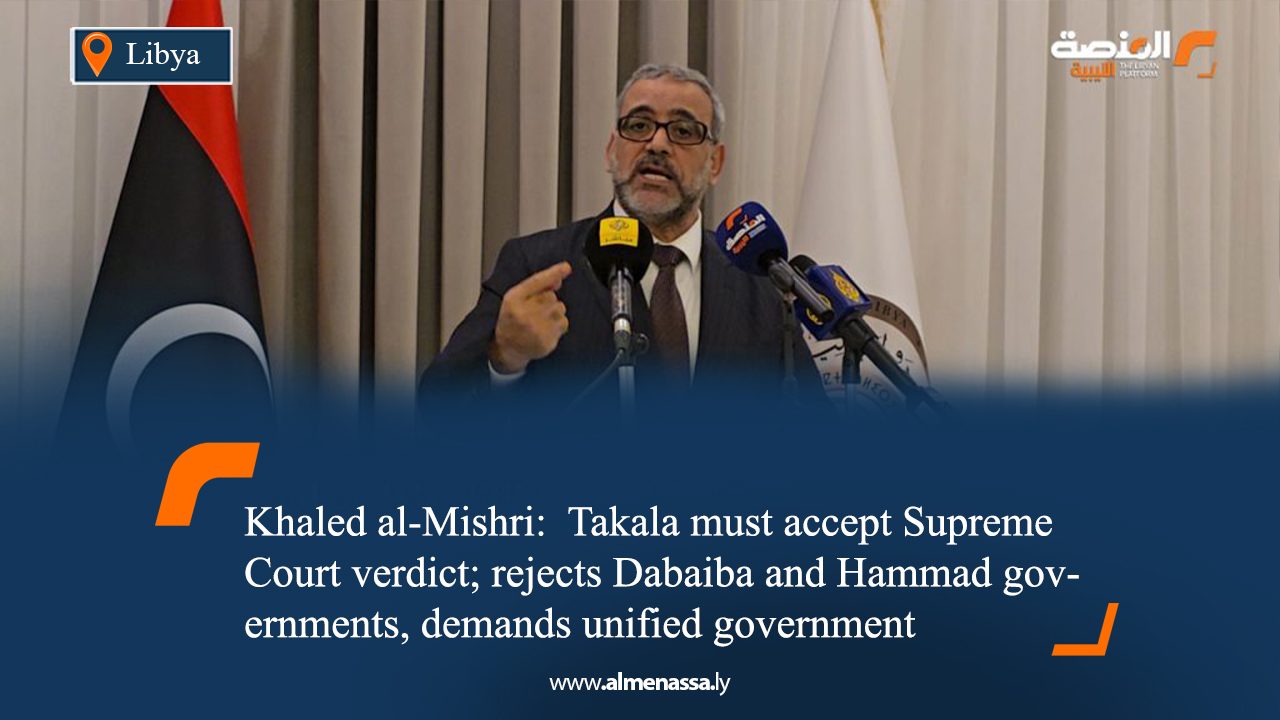Khaled al-Mishri, head of the High Council of State, announced that Libya’s Supreme Court has resolved the legal dispute regarding the council’s presidency. The court rejected the appeal filed by Mohamed Takala against al-Mishri’s election as president, a ruling that affirms the decision remains in force, ending the internal contention within the council and confirming its resumption of internal and external activities.
Speaking at a press conference, al-Mishri explained that the council’s presidential election took place for the first time on 6 August 2024, resulting in his victory. However, the losing party, represented by council member Mohamed Meftah Takala, rejected the outcome and filed an appeal with the administrative judiciary approximately one month later, specifically on 4 September, challenging al-Mishri’s election.
Al-Mishri stated that the administrative judiciary had ruled to annul his election, a decision he deemed legally outside its jurisdiction. He reiterated that he had declared from the outset that the dispute should be settled either via the council’s bylaws or through the Supreme Court’s Constitutional Circuit. He added that the council appealed the administrative judiciary’s decision before the Supreme Court, which on Tuesday officially ruled that the administrative judiciary lacked jurisdiction, issuing the reasons for its verdict. This, according to al-Mishri, renders his presidency of the council final and protected by a definitive ruling.
Al-Mishri confirmed that the council immediately initiated procedures to engage with all relevant local and international bodies, which, he claimed, showed understanding and positive responsiveness, in preparation for completing the formation of the presidency office within the council.
Al-Mishri underscored that the strategic objective of the High Council of State is to end the protracted transitional phases in the country.
Commenting on the recent demonstrations in the capital, Tripoli, and other Libyan cities, al-Mishri stated that the High Council of State responded early to the protesters’ demands, asserting that “the Government of National Unity (GNU), led by Abdul Hamid Dabaiba, has lost its legal and popular legitimacy, and is now legally expired following the resignation of a significant number of its ministers.”
He added that the current situation, where Dabaiba has assigned himself sovereign portfolios such as defence and foreign affairs, is unacceptable, and that the government’s management of militias by empowering loyal factions and marginalising others threatens security and stability.
Al-Mishri further affirmed that the High Council of State does not recognise the government of the former prime minister designated by the House of Representatives, Fathi Bashagha, nor his successor, Osama Hammad, due to the lack of legitimate consensus on either.
Al-Mishri clarified that the High Council of State, in agreement with the House of Representatives, has fulfilled its obligations regarding the electoral process by issuing Laws No. 27 and 28 of 2023 concerning the election of the National Assembly and the head of state. These laws were published in the Official Gazette, in addition to the referral of the draft constitution and the referendum law to the High Commission since 2020.
He added that conducting elections requires a unified government to oversee the process, and that both councils retain the right to choose this government in coordination with the UN mission, without relinquishing this sovereign right.
Al-Mishri criticised the United Nations Support Mission in Libya (UNSMIL), asserting that it has not fulfilled its mandated role in supporting the political process, especially following the 6+6 committee’s completion of the third constitutional amendment and electoral laws.
He stated that the mission is not a guardian over the Libyan people, and its role should be confined to logistical support, such as managing national identification numbers and providing biometric verification tools.
Al-Mishri pointed out that the killing of Major General Abdul Ghani al-Kikli (Ghaniwa) led to a serious security breakdown in the Bouslim area, affirming that this deteriorating security situation is one of the causes of the demonstrations.
He stressed the necessity of forming a single government that asserts its sovereignty over all Libyan territories to avoid contradictions in decisions, citing the Gaza convoy incident, which faced obstacles in moving between western and eastern regions, as if Libya had become “two states”.
Regarding the Gaza convoy, al-Mishri affirmed that it is a genuine popular movement not backed by any official or political entities. He rejected its political exploitation or attempts to obstruct it, calling for its passage and facilitation.
He stated that preventing the convoy or discriminating in its treatment based on areas of control exposes the absence of national sovereignty and underscores the urgent need for a unified executive authority.
Al-Mishri expressed his support for all who repel aggression against Gaza, affirming that the systematic annihilation inflicted upon the strip exposes the entire world and unmasks regimes that boast about democracy and human rights.
He said that Libya supports the resistance and rejects the Zionist occupation, noting that the continuation of aggression could extend to other countries unless it is stopped.
“We support and bless all strikes carried out by Iran against the Zionist entity. Yes, we differ with Iran on its regional policies in Syria, Lebanon, or Yemen, or even on some aspects of its political system, but this has no bearing on the ongoing battle against the occupation. We are now facing a common enemy, and the Zionist entity operates with a ‘gradual dismantling’ approach, swallowing countries one after another. Today it’s Iran, and tomorrow it might be Saudi Arabia, Turkey, Pakistan, or Egypt. Everyone must grasp the scale of the threat, for danger is coming to all unless positions are unified.”


